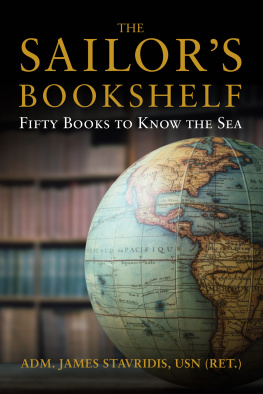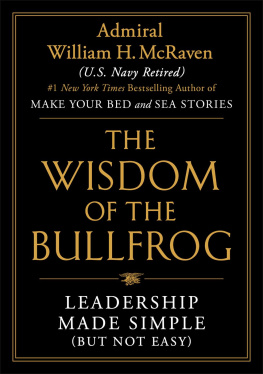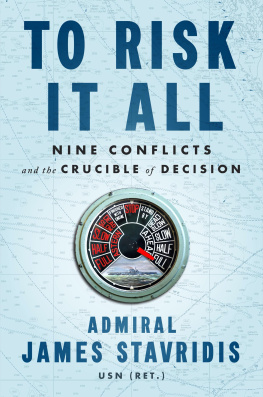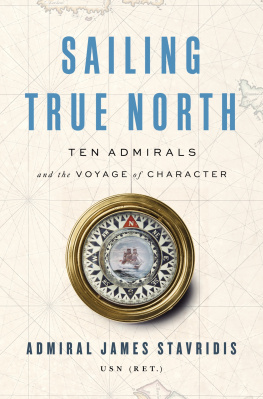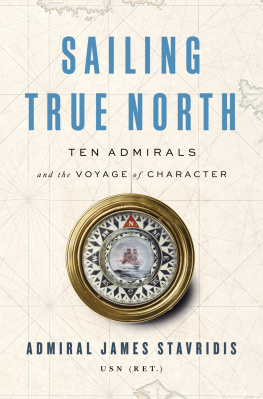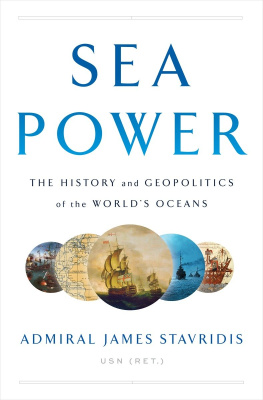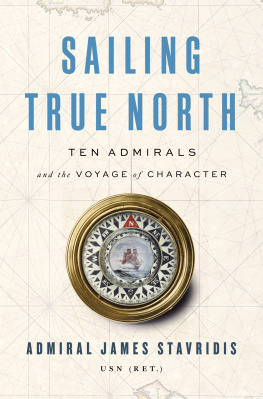THE ACCIDENTAL
ADMIRAL
BOOKS BY ADM. JAMES STAVRIDIS
Partnership for the Americas:
Western Hemisphere Strategy and U.S. Southern Command
Destroyer Captain:
Lessons of a First Command
Watch Officers Guide,
Thirteenth and Fourteenth Editions
Division Officers Guide,
Tenth Edition
BOOKS CO-AUTHORED BY ADM. JAMES STAVRIDIS
Command at Sea,
Fifth and Sixth Editions
Watch Officers Guide,
Fifteenth Edition
Division Officers Guide,
Ninth and Eleventh Editions


Naval Institute Press
291 Wood Road
Annapolis, MD 21402
2014 by Adm. James G. Stavridis, USN (Ret.)
All rights reserved. No part of this book may be reproduced or utilized in any form or by any means, electronic or mechanical, including photocopying and recording, or by any information storage and retrieval system, without permission in writing from the publisher.
Library of Congress Cataloging-in-Publication Data
Stavridis, James.
The accidental admiral : a sailor takes command at NATO / Adm. James Stavridis, USN (Ret.).
1 online resource.
Includes bibliographical references and index.
Description based on print version record and CIP data provided by publisher; resource not viewed.
ISBN 978-1-61251-782-7 (ePub) 1. Stavridis, James. 2. AdmiralsUnited StatesBiography. 3. United States. NavyOfficersBiography. 4. North Atlantic Treaty OrganizationBiography. 5. United StatesHistory, Military20th century. 6. United StatesHistory, Military21st century. 7. United StatesArmed ForcesTechnological innovationsAnecdotes. I. Title. II. Title: Sailor takes command at NATO.
E745.S675
359.0092dc23
[B]
2014025183

 Print editions meet the requirements of ANSI/NISO z39.48-1992 (Permanence of Paper).
Print editions meet the requirements of ANSI/NISO z39.48-1992 (Permanence of Paper).
22 21 20 19 18 17 16 15 14 9 8 7 6 5 4 3 2 1
First printing

For Laura, Christina, and Julia


CONTENTS



A tweet: in less than 140 characters I accidentally encapsulated my time as supreme allied commander at NATO. It was October 2011, and I was preparing to recommend to the North Atlantic Council ambassadors that we conclude combat operations in Libya. For the previous 8 months we had been pounding the Libyan regime daily using precision-guided munitions on our UN-authorized mission to protect the people of Libya from the brutal Qaddafi regime. After more than 24,000 strikes and 3,000 at-sea intercepts, it was clear that the people of Libya were in control of their own destiny, and I felt it was time for us to call a halt to Operation Unified Protector.
But I caused a diplomatic stir by sending out a tweet to the world explaining what I would recommend to the twenty-eight ambassadors later that day. News organizations picked it up, and soon the story of the first war whose end was announced on Twitter was making the rounds. When I went to Brussels to brief the ambassadors, I faced some resistancenot because anyone wanted to continue combat operations, but because I had violated some unwritten rule on diplomatic communications. The French ambassador, a good friend, in particular seemed quite miffed about my faux pas.
Such is NATO, where no innovation goes unchallenged, even in good cause. But the good news was that it was good news. The council accepted the recommendation a few days later, and the most successful NATO operation of my time in command came to a reasonably happy outcome. I continue to tweet early and often.
At the beginning of my Navy career I never dreamed that I would end up a four-star admiral in command of all NATO operations and would tweet the end of a war. In fact, my plan was to graduate from Annapolis, serve for the obligatory five years, and head off to law school. Yet I sailed on well past the five-year limit and recently finished thirty-seven years in uniform. It all seems an accidental outcome in so many ways, as is true for nearly everyones life, I suppose. Our plans never quite survive contact with the real world.
My plan collided with reality this way. As my five-year commitment ended in early 1981, I had applications in at Yale Law School (wait-listed) and a number of other prestigious schools of law (accepted at several). I had submitted my resignation to the Navy and was about to begin what I hoped would be an interesting (and profitable) career as a corporate lawyer.
Then Mike Mullen called me. At the time, the future chairman of the Joint Chiefs of Staff was a lieutenant commander working in the Bureau of Naval Personnel. He had been a company officer at Annapolis during my time there and was an early mentor who helped me decide on the surface Navy (as opposed to submarines, aviation, or the Marine Corps).
Stavridis, what is this I hear about you getting out? was his opening line, delivered as usual without preamble or foreplay.
I explained why I wanted to go to law school, assured him that I had loved the Navy but really wanted to try something else, and laid out what I thought was a defendable argument for my exodus.
You want law school. OK. Let me try and get the Navy to send you to a law school. Ill call you back. Dial tone.
Next page

